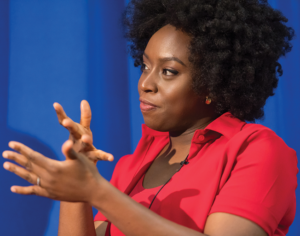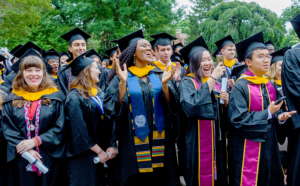Each year, the schools of Georgetown University set out to select individuals who embody the values of the institution to deliver the commencement addresses to the graduating class. Though they conclude graduates’ time at Georgetown, these addresses also mark the beginning of their futures as alumni and their entrance into the world beyond the front gates.
As graduates prepare to leave Georgetown, commencement addresses encourage the newly minted alumni to look beyond the Hilltop, according to Margaret Chappell (SFS ’19), president of the School of Foreign Service Academic Council.
“To me, commencement speakers are the first people to properly welcome you into the ‘real world’ and provide a bit of guidance to get you started,” Chappell wrote in an email to The Hoya. “In a moment when so many things are uncertain, they represent stability in the future and provide comfort by sharing their own, often unexpected career paths.”
Ten speakers have been announced to address the commencement ceremonies at the undergraduate and graduate levels.

Best selling author Chimamanda Ngozi Adichie will address Georgetown College; Joseph Baratta (GSB ’93), global head of private equity at the asset management company Blackstone, will address the McDonough School of Business; Joan Rosenhauer, executive director of Jesuit Refugee Service, will address the School of Nursing and Health Studies; and Madeleine Albright, former secretary of state and professor in the practice of diplomacy in the School of Foreign Service, will address the SFS.
Other notable speakers who will address the graduate schools of Georgetown university include celebrity chef José Andrés, who will address the McCourt School of Public Policy, and former Chief of Staff to First Lady Michelle Obama Tina Tchen, who will address the School of Continuing Studies.
These speakers ultimately decide what remarks and advice they will deliver to graduates. Even though Georgetown cannot write the final lesson its graduates will hear on its campus, it nevertheless takes great care to ensure this message will be consistent with the education and values it has instilled into its students over the course of their time on the Hilltop.
Selecting a Speaker
The process of deciding speakers for this week’s ceremonies begins much earlier than many may expect, even before the start of this academic year.
Each of Georgetown’s schools employs its own method of selecting the commencement speaker. Some seek student feedback, while others only involve members of the faculty.
The College uses a selection committee combined with both students and faculty for its nomination process. The College Executive Council, which includes representatives from the academic departments and programs, the Dean’s Office and the College Academic Council, makes initial nominations for commencement speakers for the College.
Nominations are then sent to the Georgetown board of directors for review and approval.
The McDonough School of Business, however, only solicits ideas for speakers from the academic leadership, who submit the list to the Office of the Provost. The Office of the President and the Georgetown board of directors must then approve the speaker before inviting them. The SFS similarly does not invite student input from the SFS academic council.
Beyond considering individuals who reflect Georgetown’s values, the university also identifies candidates whose actions make them deserving of the honorary degree granted to all commencement speakers, according to Sue Lorenson, vice dean for undergraduate education for the College.
“It’s not enough to be a great public speaker or an accomplished scholar; the speaker should possess a combination of professional achievements and admirable personal qualities,” Lorenson wrote in an email to The Hoya.
The MSB seeks speakers who offer real world experience in a continually changing international market, according to Teresa Mannix, senior assistant dean for communications at the MSB.
“Each year, we seek global business leaders who represent our Georgetown values and who can address how our students can become leaders in a rapidly changing world,” Mannix wrote in an email to The Hoya.
The School of Nursing and Health Studies aims to find speakers who will encourage graduates to follow a path of equality and justice in the health fields — core values of the NHS, according to Patricia Cloonan, outgoing dean of the NHS.
“A message that I often share with graduating students involves carrying forth the mission, vision, and values of this great institution, including our own school, as they pursue careers throughout the health fields,” Cloonan wrote in an email to The Hoya. “Our community, regardless of major or program, is one that orients around the promotion of health equity, the common good, and social justice.”
An Evolution of Values
Commencement speakers have always sought to embody Georgetown’s core values in some form. As these values have evolved over time, however, the commencement speeches and ceremony have also evolved to reflect these changes.
Commencement speakers over time highlight the fluid nature of the university’s values throughout the years, according to Lorenson.
“Because universities are living, breathing entities, their values evolve and grow over time, and Commencement speakers can represent that change,” Lorenson wrote. “In 2016, our speaker was (alumna) Alexandra Cousteau, an environmental activist – a reflection of the university’s increased focus on environmental issues.”
Early university commencement ceremonies, which date back to the mid-1600s, tended to highlight students’ speeches, demonstrating the oratory skills of the speakers, often by displaying their proficiency in classical languages.

The 1894 Georgetown commencement ceremony included a class poem, bachelor’s oration, master’s oration and valedictory, all given by student speakers. The bachelor’s oration was delivered by Condé Nast, who would go on to found the self-named mass media company that counts Vogue, Vanity Fair and The New Yorker among its many prominent publications.
As universities deemphasized oratory skills in their curricula, student speeches were featured less centrally in ceremonies, which were instead built around the addresses of principal speakers.
Between 1930 and 1936, Georgetown commencement speakers vice president and a regent of the university, as well as a judge of the D.C. Supreme Court. Even as late as 1966, the president of Georgetown delivered the commencement address to graduates.
By the end of the millenium, however, universities regularly invited celebrities such as actors, filmmakers and writers, as well as business executives to their graduation ceremonies.
Humorist Art Buchwald addressed graduates of the college in 1979, and since then, filmmaker Ken Burns, basketball player Dikembe Mutombo (SLL ’91) and former moderator of NBC’s “Meet the Press” Tim Russert have all spoken at Georgetown graduation ceremonies.
The shift in commencement speakers chosen also witnessed a shift in the style of the speeches. When speeches were were given by students, they more often featured arguments and posed questions. Speakers now often seek to offer insights or advice based on their own lived experiences.
A Multicultural Focus
In addition to the speakers invited for graduation exercises, commencement week also features specialized ceremonies for different minority communities on campus.
The LGBTQ Resource Center annually hosts Lavender Graduation, a ceremony that honors members and allies of the LGBTQ community for their accomplishments while at Georgetown.
Joshua Javier Guzmán (SFS ’10), assistant professor in the department of gender studies at UCLA, was the keynote speaker at this year’s graduation ceremony, held April 25.
The Center for Multicultural Equity and Access hosts multicultural graduation ceremonies like Despedida, Harambee and Asian Heritage that aim to celebrate students through their respective cultures. These ceremonies will all take place May 16.
The university first recognized these multicultural graduation ceremonies as official university ceremonies in 2013, when the Office of the Provost provided additional resources to the graduation ceremonies and named CMEA as responsible for offering administrative support.
Before the university recognition, however, these cultural celebrations were still happening on a smaller scale with fewer resources, according to CMEA Director Charlene Brown-McKenzie.
Unlike the main undergraduate commencement services, speakers for the multicultural graduation ceremonies are chosen directly by students and advisors, who make their selection from a list of prominent alumni that identify with their community, according to Brown-McKenzie.
These ceremonies not only seek student input in the selection of the speakers, but are also led by students, including speeches from many key student leaders identified on their personal journeys, Brown-McKenzie wrote in an email to The Hoya.
The multicultural graduation ceremonies seek to provide a more diverse celebration than the main commencement services. The alumni speakers are meant to be representatives to the crowd they are addressing, according to Brown-McKenzie.
“We hope each distinguished alumni speaker will inspire and engage the Senior Class of 2019 whose lived experiences emerge from the African Diaspora, Latinx and Asian American Pacific Islander backgrounds,” Brown-McKenzie wrote. “Speakers are invited to share their wisdom with the graduating class as they embark on becoming global citizens.”



















